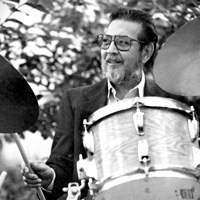Home » Jazz Musicians » Vernel Fournier
Vernel Fournier
Vernel Fournier made his name as the deftly understated and highly musical drummer in one of the most famous of all modern jazz trios, led by pianist Ahmad Jamal. His subtle, quicksilver touches with his trademark wire brushes provided the flexible underpinning for a trio which thrived on its supple manipulation of dynamics and use of space.
He was born Vernel Anthony Fournier in New Orleans, and the distinctive rhythmic feel of the city never disappeared from his music. He began playing parade drum at the age of ten with a marching group, the Young Swingsters, and was taught by the New Orleans drummer Sidney Montague while still in school.
He attended Alabama State College in 1945-56, where he played with the student ensemble, and also worked in his home town with musicians from both the traditional and bebop strands of the city’s musical culture. He moved to Chicago in 1946, where he worked with the rhythm and blues band led by King Kolax.
He played with a number of Chicago based musicians, including Paul Bascomb and pianist Teddy Wilson. He was the house drummer at the Bee Hive club on Chicago’s South Side in 1953-55, where he accompanied many visiting soloists, including luminaries like Lester Young, Ben Webster, Sonny Stitt, J.J. Johnson and Stan Getz.
He joined Ahmad Jamal’s trio in 1957, along with bass player Israel Crosby, and remained with the group until 1962. The trio was resident at the Pershing Lounge in the city, and built a national reputation with a series of very successful recordings for the famous Chess label.
The best known of these records, “Live at the Pershing,” was released in 1958, and included their famous version of ‘Poinciana’. It became one of the best selling jazz records of all time, and remained on the Billboard jazz charts for over two years. Fournier’s sensitive and responsive contribution to the group’s distinctive ensemble sound was a crucial one. His subtle brush work, fluid fills and lithe swing were often understated, but always precisely to the point.
After leaving the Jamal trio, Fournier joined the band led by another leading pianist of the day, George Shearing, and remained with the London-born pianist for two years. He rejoined Ahmad Jamal for a time in 1965-66, and also worked with singer Nancy Wilson. He led his own trio in Chicago until 1979. He converted to Islam in 1975, and took the Muslim name of Amir Rushdan.
Read moreTags
Ahmad Jamal: Emerald City Nights - Live at the Penthouse 1965-1966

by Alberto Bazzurro
Secondo volume, anche questo doppio (minutaggio, in realtà, di un singolo lungo: 78:30), della saga jamaliana: dopo gli anni 1963-1964, si attraversa qui il biennio successivo, per l'esattezza il 18 e 25 marzo (con Chuck Lampkin alla batteria) e il 28 ottobre (con Vernel Fournier al suo posto) 1965, e il 22 settembre dell'anno seguente (con Frank Grant dietro i tamburi), sempre in concerto al Penthouse di Seattle. Nessuno dei nove brani qui presenti figurava nel precedente ...
read moreAhmad Jamal: Emerald City Nights: Live at the Penthouse

by Alberto Bazzurro
Come cadeau da far(si) in prospettiva più o meno natalizia, la Jazz Detective—nuova etichetta del produttore Zev Feldman, sempre attivissimo nel riesumare registrazioni inedite (come qui) o comunque rare—recupera una serie di live sessions dei trii che Ahmad Jamal diresse attorno alla metà degli anni Sessanta e raccoglie il tutto in due doppi CD (o doppi LP) del cui primo ci occupiamo oggi, e del successivo a breve (ottimi i riversamenti, generosi i libretti di accompagnamento, con foto rare, note ...
read moreAhmad Jamal: Emerald City Nights: Live at the Penthouse

by Karl Ackermann
2022 marks the ninety-second year of pianist and composer Ahmad Jamal. An NEA Jazz Master and Grammy winner, in 2007 he was designated a Kennedy Center honoree as a Living Jazz Legend. His first release was The Three Strings (Epic, 1951) and, throughout that decade, he recorded a dozen albums, all in a piano trio format. Of Jamal's approximately seventy recordings, he has employed orchestras, choirs, and larger ensembles but his catalog includes dozens of trio releases. His groundbreaking At ...
read moreThe Complete Ahmad Jamal Trio Argo Sessions 1956-62

by David Rickert
Ahmad JamalThe Complete Ahmad Jamal Trio Argo Sessions 1956-62Mosaic Records2010 If you're familiar with pianist Ahmad Jamal, it's more likely through his reputation and not through his music. Trumpeter Miles Davis famously remarked that Jamal taught him to be more economical in his playing: that the notes that aren't played are just as important as the ones that are. He was an enormously influential pianist in the 1950s who, despite a hit ...
read moreThe Complete Ahmad Jamal Trio Argo Sessions 1956-62

by Eugene Holley, Jr.
"When I listen to these records now... when I listen to the Pershing, it's phenomenal, I must say. What they were doing, phenomenal, the lines and the purity. It's so pure ... It was sheer joy working with these two individuals. Master musicians," writes pianist/bandleader Ahmad Jamal in the liner notes to this collection. If there ever was a subject worthy of a Mosaic box set, Jamal is it. For six decades, he has been, for several reasons, ...
read more






















